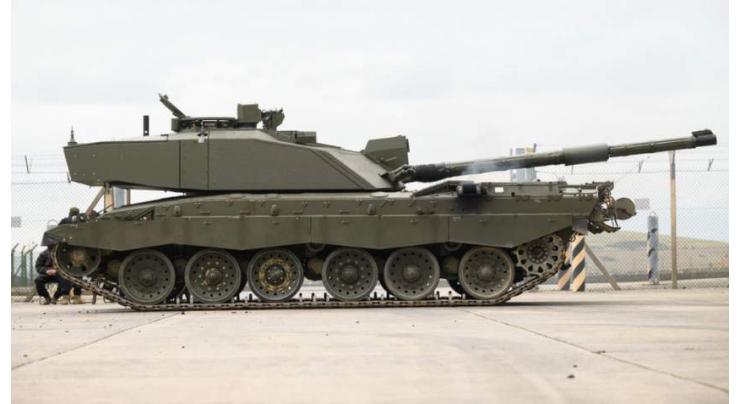
- Home
- World
- News
- Depleted Uranium Shells Unlikely to Give Decisive Advantage to Ukrainian Troops - Expert
Depleted Uranium Shells Unlikely To Give Decisive Advantage To Ukrainian Troops - Expert
Fahad Shabbir (@FahadShabbir) Published March 22, 2023 | 09:31 PM

The use of depleted uranium shells which the UK has vowed to supply to Ukraine would not give a decisive advantage to the Ukrainian troops and could merely be dangerous for the forces using these shells and for environment, military expert Pierre Henrot told Sputnik
MOSCOW (UrduPoint News / Sputnik - 22nd March, 2023) The use of depleted uranium shells which the UK has vowed to supply to Ukraine would not give a decisive advantage to the Ukrainian troops and could merely be dangerous for the forces using these shells and for environment, military expert Pierre Henrot told Sputnik.
On Tuesday, UK Minister of State for Defense Annabel Goldie said that the country will provide Ukraine with depleted uranium tank ammunition, including armor piercing shells for the 14 Challenger 2 battle tanks UK is planning to Ukraine.
"One of the most recent technologies in artillery, is the artillery shells containing depleted uranium. The most important quality of these 'arrowhead' shells, available for decades already, is that the very dense metal that is uranium is much harder than steel, just like tungsten for example ... These depleted uranium ammunitions are very effective in destroying modern tanks and armored vehicles, but I don't think such ammo would give a decisive advantage to the army using them in Ukraine," Henrot said.
The expert, who is also a former nuclear battery commander in NATO and UN Blue Helmet officer in the Balkans, stated that these shells were widely used by the US and NATO armies in the wars in Kosovo and Iraq or during the operation in Libya. Since then, there has been a debate within NATO as to whether the shells could be dangerous for the troops using them and for the environment in general, according to Henrot.
"In NATO armies, there is a debate about the danger represented by the radioactivity and irradiation that can be caused by these shells in the confined space of a tank. The armored units soldiers don't like the idea of remaining a long time with the shells in the confined space of a tank.
If it is a danger for the tank crew, it is also dangerous of course for the area where the enemy tank has been destroyed. The radiation caused by the remnants of the shell and the tank debris remains for a long time in the immediate environment," Henrot argued.
The military expert also cited independent studies carried out by various non-governmental organizations showing excess cancer mortality in the regions where bombardments with depleted uranium shells have taken place. Henrot mentioned anti-nuclear organization "Campaign for Nuclear Disarmament", which condemned the UK government's decision to send uranium shells to Kiev, saying that it would be an "additional environmental and health disaster for those living in the heart of the conflict."
At the same time, both the UK and the US are not interested in the publication of reports on any negative effects of this type of ammunition on health and the environment, according to the expert.
"The US and NATO have every interest in claiming that depleted uranium munitions are harmless and that the radiation emitted is negligible. To admit otherwise would lead them to pay huge damages to the people of Kosovo, Iraq, Libya ... Only Belgium has banned this type of ammunition, showing that the perception that these ammunitions are dangerous, is very real," Henrot explained.
If these shells were used by Ukraine, Russian forces would have the means to retaliate, including reaching for its own large stock of depleted uranium, though Moscow was unlikely to have any intention of polluting Ukraine with radioactive materials, Henrot concluded.
Related Topics
Recent Stories

At least 10 people killed in Brazil fire: officials

Shahzaib Rind calls on Deputy Speaker Balochistan

Ahsan chairs 13th CPEC-JCC preparatory meeting, reviews arrangements for high-le ..

DC Tharparkar inaugurates anti-polio campaign

HDA Mehran workers demand salaries

Taxila police nab motorcycle lifter gang

Inter-university weightlifting championship kicks off at SAU

Walk held in a series of enrollment campaigns

Team from Gaza mediator Egypt arrives in Israel for truce talks

Kids murders: IHC orders psychiatric examination of mother

Health minister credits PML-N for advancements in organ transplantation

Court grants interim bail to Azam Swati in cyber crime case
More Stories From World
-

At least 10 people killed in Brazil fire: officials
11 minutes ago -

Team from Gaza mediator Egypt arrives in Israel for truce talks
15 minutes ago -

Kenya flood death toll since March climbs to 70
14 minutes ago -

Two Kyiv hospitals evacuating over feared Russian strikes
10 minutes ago -

Junta-led Burkina Faso suspends BBC, Voice of America for two weeks
1 hour ago -

Romania court opens way for start of influencer Tate's trial
2 hours ago
-

Kenya flood death toll since March climbs to 70
2 hours ago -

At least 10 people killed in Brazil fire: officials
2 hours ago -

Russia targets Ukraine railways as Western aid due to arrive
2 hours ago -

Miner Anglo American rejects BHP's near $39-billion takeover bid
2 hours ago -

At least 10 people killed in Brazil fire: officials
2 hours ago -

Junta-led Burkina Faso suspends BBC, Voice of America for two weeks
2 hours ago











